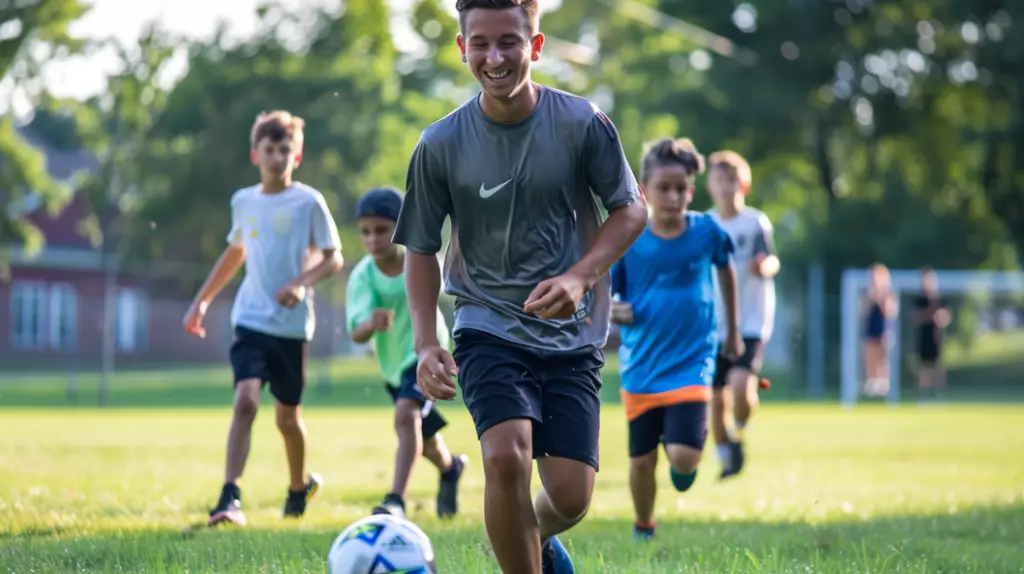Soccer coaching is an art that combines strategy, psychology, and passion. Whether new to coaching or a seasoned veteran, refining your techniques is crucial for success. It is not just about teaching players how to kick a ball or score goals; it is about instilling a love for the game, developing skills, and fostering a positive team culture. Understanding the fundamentals of football coaching is essential for anyone who wants to make a difference in the lives of young athletes and help them reach their full potential.
Understanding the Fundamentals of Soccer Coaching
Soccer coaching involves much more than standing on the sidelines and giving instructions. It requires a deep understanding of the game and the ability to communicate and motivate players effectively. Coaches must have a strong knowledge of the rules, strategies, and techniques of football and an understanding of child development and psychology.
In addition to technical skills, coaches must possess leadership qualities and be able to inspire and motivate their players. They must create a positive learning environment where players feel safe to make mistakes and learn from them. Coaches must also be able to adapt their coaching style to meet the needs of individual players and the team as a whole.
Developing Effective Coaching Strategies for Success
Having a coaching philosophy is essential for success as a football coach. A coaching philosophy is a set of beliefs and values that guide your approach to coaching. It helps you define your goals, set expectations, and make decisions that align with your values.
Coaches can employ many different coaching strategies, depending on their philosophy and team needs. Some coaches prefer a more hands-on approach, while others take a more hands-off approach and allow players to take ownership of their development. Coaches need to choose a strategy that aligns with their philosophy and the needs of their team.
Building Strong Relationships with Players and Parents
| Metrics | Description |
|---|---|
| Player Retention Rate | The percentage of players who continue to play on the team year after year. |
| Parent Satisfaction Survey Results | The survey results were given to parents to gauge their satisfaction with the team and their child’s experience. |
| Number of Parent-Coach Meetings | The number of meetings held between coaches and parents to discuss player progress and team goals. |
| Player Feedback | The feedback received from players regarding their experience on the team and their relationship with coaches and parents. |
| Number of Volunteer Hours | The number of hours volunteered by parents to support the team and its activities. |
Building strong relationships with players and parents is crucial for success as a football coach. Players must trust and respect their coach to fully commit to the team and the sport. Parents also play a vital role in a player’s development and can greatly influence their experience.
To build trust and rapport with players, coaches should take the time to get to know each player individually. They should show genuine interest in their lives and listen to their concerns and goals. Coaches should also be approachable and create an open line of communication with players so they feel comfortable discussing any issues or challenges they may face.
Coaches should be transparent when building relationships with parents and keep them informed about their child’s progress and development. Regular communication through emails, meetings, or parent/player conferences can help foster a positive relationship and address parents’ concerns or questions.
Enhancing Your Communication Skills as a Coach
Effective communication is a vital skill for any football coach. It is not just about giving instructions; it is about connecting with players on a deeper level and motivating them to perform at their best. Coaches can use different types of communication, including verbal, non-verbal, and written communication.
Verbal communication involves using words to convey information or instructions. Coaches should be clear and concise when giving instructions, using simple language that players can understand. They should also use positive language and provide constructive feedback to help players improve.
Non-verbal communication includes body language, facial expressions, and gestures. Coaches should be aware of their body language and use it to convey confidence and positivity. They should also pay attention to the body language of their players, as it can provide valuable insights into their emotions and mindset.
Written communication can provide information or feedback to players or parents. Coaches should take the time to write personalized messages specific to each player’s needs or achievements. This can help build trust and show that the coach is invested in the player’s development.
Creating a Positive Team Culture and Environment

Creating a positive team culture is essential for success as a football coach. A positive team culture fosters players’ sense of belonging, motivation, and commitment. It also helps create an environment where players feel safe to take risks and learn from their mistakes.
Coaches should set clear expectations and values to create a positive team culture. They should establish a code of conduct outlining acceptable behavior and consequences for violations. Coaches should also lead by example and demonstrate the values they expect from their players.
Creating a positive team environment involves creating a sense of camaraderie and teamwork among players. Coaches can organize team-building activities like group exercises or outings to help players bond and develop trust. They should also encourage open communication and create opportunities for players to provide feedback and contribute to team decisions.
Maximizing Player Performance through Effective Training Techniques
Training is a crucial aspect of football coaching, as it helps players develop their skills, improve their fitness, and enhance their tactical understanding of the game. There are different training techniques that coaches can use, depending on the needs of their team.
When choosing training techniques, coaches should consider their players’ age, skill level, and goals for the season. They should also consider the time available for training and any limitations or constraints they may have.
Structured training sessions are important for maximizing player performance. Coaches should plan their sessions and have clear objectives for each session. They should also vary the drills and exercises to keep players engaged and motivated.
Analyzing and Improving Tactical Decision-Making
Tactical decision-making is an important aspect of football coaching. It involves analyzing the game, making strategic decisions, and adjusting tactics based on the strengths and weaknesses of the opposing team.
Coaches should watch and analyze their team’s games and professional matches to improve tactical decision-making. They should pay attention to the tactics used by successful teams and try to incorporate them into their coaching.
Coaches should also encourage players to think tactically and make decisions on the field. They can do this by asking players questions during training sessions or games and encouraging them to come up with solutions to problems.
Utilizing Technology to Enhance Coaching Effectiveness
Technology can be a valuable tool for football coaches, as it can help enhance coaching effectiveness and improve player performance. Coaches can use many types of technology, including video analysis software, GPS tracking devices, and performance monitoring tools.
Video analysis software allows coaches to record and analyze games or training sessions. They can use this footage to identify areas for improvement and provide feedback to players. GPS tracking devices can monitor player performance and track their fitness levels. Performance monitoring tools can provide valuable insights into player performance, such as speed, distance covered, and heart rate.
Managing and Motivating Players to Achieve Success
Managing and motivating players is a crucial aspect of football coaching. Coaches must be able to manage player behavior and discipline effectively, as well as motivate players to perform at their best.
To manage player behavior, coaches should establish clear rules and consequences from the start. They should be consistent in enforcing these rules and address any violations promptly. Coaches should also create a positive learning environment where players feel safe to express themselves and make mistakes.
Motivating players involves understanding their individual needs and finding ways to inspire them. Coaches should take the time to get to know each player individually and understand what motivates them. They can then tailor their coaching approach to meet the needs of each player.
Continuously Improving Your Coaching Skills and Knowledge
Continuous learning and improvement are essential for success as a football coach. The sport constantly evolves, and coaches must stay up-to-date with the latest coaching trends and techniques.
Many resources are available for coaches to continue their education, including books, online courses, and coaching clinics. Coaches should take advantage of these resources and seek out opportunities for professional development.
Coaches should also take the time to reflect on their coaching practices and seek feedback from players, parents, and other coaches. They should be open to constructive criticism and use it as an opportunity for growth.
Soccer coaching is a complex and rewarding endeavor that requires a deep understanding of the game and strong leadership and communication skills. By understanding the fundamentals of football coaching and continuously improving their skills and knowledge, coaches can positively impact the lives of young athletes and help them reach their full potential.
If you’re looking to enhance your football coaching techniques, look no further than this insightful article on Kicka Football’s website. This article provides valuable tips and strategies for coaches to improve their training sessions and maximize player development. From effective communication to creating engaging drills, this resource covers it all. Don’t miss the opportunity to take your coaching skills to the next level. Check out the article here and start implementing these techniques today!






